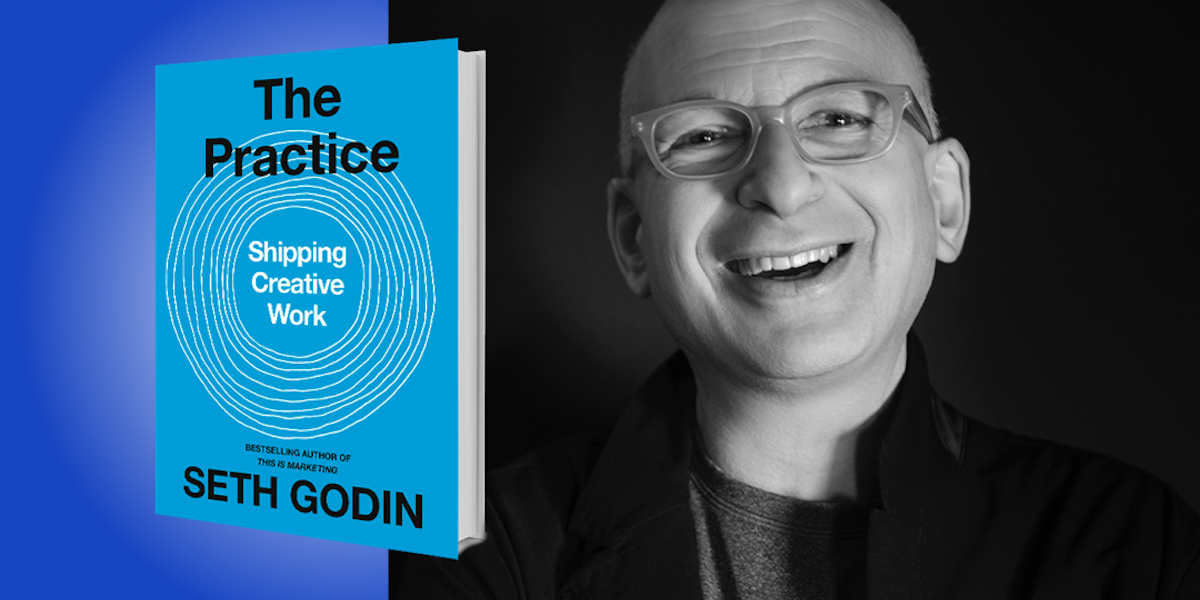Seth Godin has started successful companies, taught millions of people, and left his mark on our creative culture. He is the author of 19 international bestsellers translated into more than 35 languages, including Tribes, Purple Cow, Linchpin, The Dip, and This Is Marketing. He writes daily at Seths.blog, one of the most popular blogs in the world.
Below, Seth shares 5 key insights from his new book, The Practice: Shipping Creative Work. Download the Next Big Idea App to enjoy more audio “Book Bites,” plus Ideas of the Day, ad-free podcast episodes, and more.
1. There’s no such thing as writer’s block.
Whether you’re a novelist or not, it’s comforting to think that we are blocked, that we’re just not in the right mood to deal with something. But people who say they have writer’s block actually have a fear of bad writing, so they’re not willing to do any writing at all. What I say to somebody who has writer’s block is, “Show me all your bad writing. Go sit down and write badly as much as you can, because sooner or later, some good stuff is going to slip through.” Isaac Asimov, who wrote and published 400 books, typed for six hours a day. Indeed, the job of someone who’s creating is to create, not to be perfect.
2. All criticism is not the same.
In our social media world, everyone feels that they are entitled to their opinion. And they are, but that doesn’t mean you have to listen to it. Some writers, for example, get all hung up on their reviews. But no matter what it is you make, a person writing a one-star review is just telling you that it wasn’t for them. And the fact is, I don’t need to know why it wasn’t for you, because my job as a creator is to serve a small, tight audience, and ignore everyone else. And even among that group, some people are bad at giving feedback. I have to ignore them, because their opinion isn’t going to be helpful. On the other hand, someone who’s good at offering criticism is a true treasure.
“The job of someone who’s creating is to create, not to be perfect.”
3. Trust yourself.
This idea is so important that it was the original title for this book. When we trust ourselves, who is doing the trusting, and who is being trusted? When you talk to yourself, who is talking and who is listening? We have all accepted the idea that there are two of us inside: There’s the one who makes excuses and offers rationalizations, who wants to conform and is easily coerced. And then there’s the other one, the one that gets credit for being a genius, for being the muse. To trust yourself is to acknowledge that that second voice has something to say. It’s not always right, but it doesn’t pay to always ignore it.
4. Genre is a platform, not a box.
What holds people back is often either ignoring or fearing genre. Genre is the category that we put an idea in before we consume it. Thai food is a category—it has a certain look and taste, and Thai restaurants have a certain feel. But if you’re presenting an idea to the world and you miss those associated cues, the audience won’t know what to do with you. For them, it would be like walking into a Thai restaurant and discovering that the only thing on the menu is pizza. So we first have to do our research and understand what other people expect.
5. Dare to be peculiar.
The word “peculiar” comes from the Latin for “cattle.” It’s private property. So “peculiar” means only you—only you could do it this way. If your motto is, “You can pick anyone, and I’m anyone,” then it’s no wonder you’re struggling as a freelancer or contributor. But when you are the one and only, we wait in line. We wait in line for Chip Kidd to design the cover of our book, or to hear Zubin Mehta perform. To be the one and only means you have to be idiosyncratic. And to be idiosyncratic, you have to understand the genre, then trust yourself enough to change that genre a bit, and stand for something meaningful.
For more Book Bites, download the Next Big Idea App today:

































